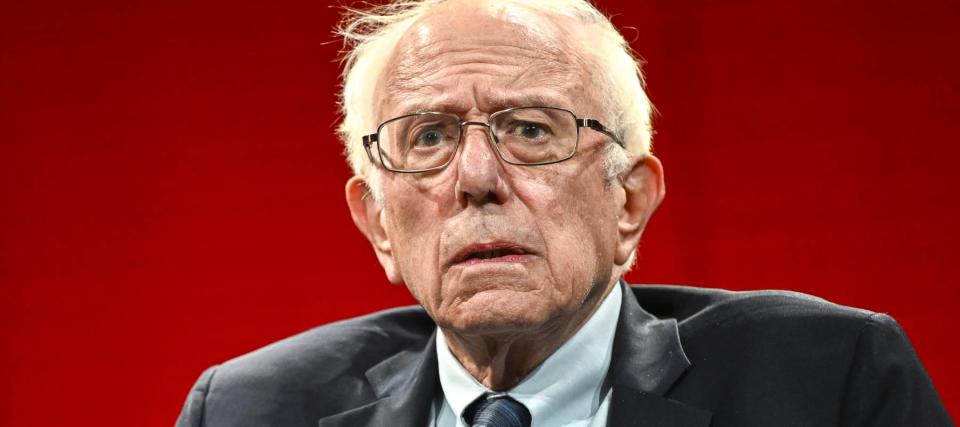'Democracy will not survive': Bernie Sanders suggests Wall Street giants BlackRock, Vanguard and State Street are gaining oligarchical power — and it's putting the US at risk. Is he right?

Democracy in the U.S. is teetering on the brink, according to Vermont senator Bernie Sanders.
The self-described democratic socialist issued the doom warning on X (formerly known as Twitter), where he took aim at institutional investors for holding too much power.
Don't miss
Commercial real estate has outperformed the S&P 500 over 25 years. Here's how to diversify your portfolio without the headache of being a landlord
Rich young Americans have lost confidence in the stock market — and are betting on these 3 assets instead. Get in now for strong long-term tailwinds
Take control of your finances in 2024: 5 money moves to start the new year off strong
“This is what oligarchy is about,” he wrote on Dec. 29. “Today just 3 Wall Street firms, BlackRock, Vanguard & State Street manage $20.7 trillion in assets. These 3 firms are major shareholders in 95% of S&P 500 companies.
“Democracy will not survive with this concentration of economic & political power.”
Is he right to be concerned?
Horizontal shareholding
The giant institutional investors singled out by Sanders — BlackRock, Vanguard Group and State Street Corporation — manage enormously popular index funds, which is one reason why they’re among the largest shareholders of many competing companies in the U.S.
For example, they’re top shareholders in some of the nation’s largest banks — including JP Morgan Chase & Co and Bank of America — and retail pharmaceutical giants — such as CVS Health and Walgreens Boots Alliance. They also own an incredible number of shares in tech behemoths Apple and NVIDIA.
An investment firm holding large stakes in different companies within the same industry is known as “horizontal shareholding.” It’s a concept that has long been criticized by people like Sanders, who believe it dampens competition in the stock market at the expense of everyday Americans trying to build wealth through investing.
Read more: Millions of Americans are in massive debt in the face of rising rates. Here's how to take a break from debt this month
Also, because institutional investors buy and sell assets in such large blocks, they have more influence and could potentially spur sudden price movements in stocks, bonds and other assets, which may increase volatility for retail investors.
There are, however, strict antitrust laws in place to promote vigorous competition and protect consumers from unfair business and market practices.
Wall Street's boogeyman
Sanders has repeatedly stated over the years one of his top political priorities is to end the “greed of Wall Street, corporate America and the billionaire class,” which he believes has led to the U.S. having “more income and wealth inequality than any other major country on Earth.”
To counter this, Sanders says he would break up too-big-to-fail banks, audit the Federal Reserve so that it becomes responsive to the needs of ordinary Americans — not just, as he believes, the billionaires on Wall Street — and restrict rapid-fire financial speculation with a financial transactions tax, among other things.
On his website, Sanders states: “The enormous concentration of ownership within the financial sector is hurting the middle class and damaging the economy by limiting choices and raising prices for consumers and small businesses.”
He is not alone in expressing concern about the seemingly oligarchical power of America’s biggest institutional investors — but it’s also important to remember that they have served the people well, at least in the past year.
The S&P 500 had a strong 24% gain in 2023. Meanwhile, both BlackRock’s iShares Core S&P 500 ETF and Vanguard’s 500 Index Fund (VOO) jumped around 26.3% in 2023, and State Street’s SPDR S&P 500 ETF Trust gained around 26.1%. These results could lead some to ask: why fix what ain’t broke?
What to read next
This Pennsylvania trio bought a $100K abandoned school and turned it into a 31-unit apartment building — how to invest in real estate without all the heavy lifting
Jeff Bezos and Oprah Winfrey invest in this asset to keep their wealth safe — you may want to do the same in 2024
The US dollar has lost 87% of its purchasing power since 1971: Learn how to diversify your portfolio by investing in the world’s most popular precious metal
This article provides information only and should not be construed as advice. It is provided without warranty of any kind.

 Yahoo Finance
Yahoo Finance 